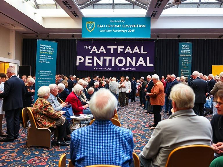
The National Pensioners Convention: Your Ultimate Guide to Britain’s Pensioner Powerhouse in 2025
Introduction: More Than Just Tea and Bingo – Why the NPC Matters in 2025
Let’s be honest, when you hear “pensioner organisation,” you might picture cosy coffee mornings or community hall gatherings. And while there’s certainly a place for that camaraderie, the National Pensioners Convention (NPC) is operating on a whole different level. Think less village fete, more national powerhouse fiercely advocating for the rights and dignity of older people across the UK.
I’ve been tracking pensioner advocacy and policy for over a decade, and I can tell you this: the NPC isn’t just *a* voice for pensioners; it’s arguably the most influential collective voice. In an era where the state pension age keeps nudging upwards, the cost-of-living crisis bites deep, and social care remains a political football, the NPC’s role has never been more critical. They’re not just talking; they’re campaigning, lobbying, and winning tangible improvements for millions.
Forget outdated stereotypes. This guide cuts through the noise. We’ll unpack exactly what the NPC is, how it evolved into the force it is today, the key battles it’s fighting right now in 2025, the impressive wins it’s secured, and crucially, how you can tap into its power. Whether you’re drawing your pension, caring for someone who is, or simply planning for the future, understanding the NPC is vital. Let’s dive in.
What Exactly Is the National Pensioners Convention (NPC)?
Put simply, the National Pensioners Convention is the UK’s largest independent organisation run by and for older people. It’s not a charity offering direct services, nor is it affiliated with any single political party. Its core mission? To campaign tirelessly for a decent standard of living, dignity, respect, and improved services for all current and future pensioners. It’s about collective action driving systemic change.
Think of the NPC as a massive umbrella. Underneath it sits a vast network of local pensioner groups, affiliated trade union retiree associations, and numerous national older people’s organisations. This structure is its superpower. Local groups tackle hyper-local issues (like bus route cuts or library closures), feeding intelligence and grassroots energy upwards. The national body then amplifies these concerns, turning them into powerful national campaigns targeting Westminster and Whitehall. It’s democracy in action, pensioner-style.
Crucially, the NPC is fiercely independent and member-led. Its policies and priorities aren’t dictated by government grants or corporate sponsors. They emerge from the lived experiences of its members, debated and voted on at its Annual Pensioners Parliament – a genuinely unique gathering that brings hundreds of pensioner delegates together to set the agenda. This bottom-up approach ensures it stays laser-focused on what really matters to older people, not what politicians or pundits think matters.
From Humble Beginnings to National Force: A Snapshot of NPC History
The NPC’s story isn’t one of overnight success; it’s a testament to decades of persistent, principled campaigning. Its roots trace back to the late 1970s, born from a growing frustration among older people and trade unionists about the inadequacy of the state pension and the rising tide of pensioner poverty. It wasn’t just about money; it was about recognition and justice.
A pivotal moment came in 1982 with the very first Pensioners Parliament held in Blackpool. This wasn’t just a meeting; it was a bold statement. Hundreds of pensioners gathered, not as passive recipients of charity, but as citizens demanding to be heard. They debated motions, passed resolutions, and sent a clear message to the government: pensioners are organised, they vote, and they demand better. This annual event remains the beating heart of the NPC, a powerful symbol of pensioner democracy.
Over the decades, the NPC has weathered political shifts and economic storms. It campaigned relentlessly against the hated Council Tax in the 90s, fought for the introduction of Pension Credit (while continuing to argue it shouldn’t be needed if the state pension was adequate), and was instrumental in securing the landmark Pensions Act 2008, which laid the groundwork for the ‘triple lock’. Its influence has steadily grown, transforming it from a pressure group into a body that governments and opposition parties alike must engage with. They learned the hard way: ignoring the NPC is politically perilous.
The Battlegrounds of 2025: What the NPC is Fighting For Right Now
The NPC’s agenda is dynamic, responding to the ever-changing challenges facing older people. In 2025, several key battles dominate their campaigning landscape, reflecting the harsh realities of the post-pandemic, cost-of-living era:
-
The State Pension Triple Lock: Defence and Enhancement: This remains the absolute cornerstone. The promise that the state pension rises annually by the highest of inflation, average earnings growth, or 2.5% is non-negotiable for the NPC. In 2025, with inflation finally receding but still impacting household budgets (especially food and energy), the NPC is fighting tooth and nail against any whispers of dilution or suspension. Their argument is simple: after contributing a lifetime, pensioners deserve a guaranteed income that maintains its purchasing power. They’re also pushing for the New State Pension to finally reach the official Pensioner Poverty Line, arguing the current level (even with the triple lock) still leaves too many struggling.
-
The Scandal of Pensioner Poverty & Take-Up: It’s a national disgrace that over 1.7 million pensioners in the UK still live in poverty (2025 figures from Age UK analysis), and hundreds of thousands miss out on vital benefits like Pension Credit. The NPC runs major campaigns to boost take-up, working with local authorities, charities, and the DWP itself. They argue the system needs radical simplification – it shouldn’t be a labyrinthine ordeal to claim what you’re rightfully entitled to. They also highlight the disproportionate impact of poverty on single female pensioners and those from ethnic minority backgrounds.
-
Social Care: Fixing a Broken System: The long-promised social care reforms remain stuck in political quicksand. The NPC is a relentless voice demanding a fair, funded, and accessible social care system. They campaign against the catastrophic costs that force people to sell their homes, for better pay and conditions for care workers (recognising this directly impacts quality of care), and for proper integration between the NHS and social care. The human cost of delay, they argue daily, is immense and unacceptable.
How Does the NPC Actually Get Things Done? Inside the Campaign Machine
Understanding how the NPC operates reveals why it’s so effective. It’s not just about shouting; it’s about strategic, evidence-based action:
-
Grassroots Mobilisation & Local Pressure: The power starts locally. NPC-affiliated groups across the country organise meetings, petitions, and local demonstrations. They meet with MPs and councillors, ensuring the pensioner perspective is heard loud and clear in every constituency. A local bus cut might seem small, but when hundreds of similar issues are reported nationally, it builds a compelling picture of systemic neglect affecting mobility and independence.
-
Lobbying & Political Engagement at the Highest Level: The NPC’s national officers and policy team are regular fixtures in Westminster. They submit detailed evidence to parliamentary inquiries, brief MPs and Lords from all parties, and meet directly with ministers and shadow ministers. They build relationships based on respect and hard facts. Their 2025 manifesto, shaped by members at the Pensioners Parliament, is a key lobbying document outlining clear, costed demands.
-
Public Awareness & Media Savvy: The NPC understands the power of the media narrative. They issue timely press releases, provide spokespeople for TV and radio (often pensioners themselves telling powerful personal stories), and leverage social media effectively to rally support and shame inaction. High-profile stunts and coordinated national days of action keep pensioner issues firmly in the public eye.
Tangible Wins: What the NPC Has Achieved for Pensioners
The NPC doesn’t just talk a good game; it has a track record of securing real improvements. Here are some landmark victories where their campaigning played a pivotal role:
-
Securing and Defending the Triple Lock: While the concept existed before the NPC, their relentless pressure was instrumental in getting it written into law via the Pensions Act 2011 and has been absolutely critical in defending it against repeated attempts to weaken or suspend it during economic downturns (especially post-2020). Every time the lock holds, it’s a win with direct financial benefits for millions.
-
Winter Fuel Payment & Cold Weather Protection: The NPC campaigned vigorously for the introduction of the Winter Fuel Payment in 1997 and has fought off subsequent attempts to means-test or scrap it. They also pushed for improvements to the Cold Weather Payment scheme, recognising the deadly impact of fuel poverty on older people.
-
Concessionary Travel: The national free bus pass for older people (the English National Concessionary Travel Scheme) is another area where NPC campaigning has been crucial, both in its introduction and ongoing defence against cuts or restrictions. Local NPC groups are often the first line of defence against council proposals to reduce local concessionary schemes.
-
Influencing Wider Policy: Beyond specific benefits, the NPC’s constant pressure has shifted the political dial on pensioner issues. They’ve helped put topics like pensioner poverty, social care funding, and age discrimination higher up the political agenda, forcing governments to respond (even if sometimes inadequately).
The Annual Pensioners Parliament: Democracy in Action
This isn’t your average conference. The Annual Pensioners Parliament (typically held over several days in June, most recently in Eastbourne) is the supreme policy-making body of the NPC. It’s where the real magic happens:
-
Delegates & Debate: Hundreds of delegates, elected from local pensioner groups and affiliated organisations across the UK, descend on the venue. They represent the diverse views and experiences of older people from every corner of the nation. These aren’t passive attendees; they’re active participants.
-
Setting the Agenda: Delegates debate and vote on motions covering the entire spectrum of pensioner concerns – from the state pension and social care to transport, health services, and digital inclusion. These motions, once passed, become the official policy platform and campaigning priorities for the NPC for the coming year. It’s direct democracy shaping a national agenda.
-
Holding Power to Account: A key highlight is the ‘Question Time’ session with leading politicians – often including government ministers and opposition spokespeople. Delegates get the chance to grill them directly on issues affecting their lives. It’s a powerful, unfiltered exchange that regularly makes national news headlines. The 2025 session saw particularly heated exchanges on the future of the triple lock beyond the next election.
Why Joining the NPC Matters (More Than Ever in 2025)
In an age of fragmented media and seemingly distant politics, collective action isn’t just nice; it’s necessary. Here’s why becoming part of the NPC makes a real difference:
-
Amplify Your Voice: One letter to an MP might be ignored. Thousands of voices, coordinated through a respected national body like the NPC, are impossible to ignore. Your individual concerns become part of a powerful national campaign. It turns frustration into focused pressure.
-
Stay Informed & Empowered: The NPC provides clear, accessible information on complex issues like benefit entitlements, pension changes, and social care reforms. Through newsletters, briefings, and local meetings, members understand their rights and the political landscape affecting them. Knowledge truly is power, especially when navigating bureaucracy.
-
Shape the Future: By joining, you contribute to the collective strength that funds campaigns and lobbying. By participating in your local group or even standing as a delegate to the Pensioners Parliament, you have a direct say in setting the NPC’s priorities. You’re not just a spectator; you’re helping to write the script for pensioner justice. As the 2024 election showed, the pensioner vote is decisive. The NPC ensures that vote is informed and demands are clear.
How You Can Get Involved with the NPC (It’s Easier Than You Think!)
Ready to add your voice? Getting involved with the NPC is straightforward and offers different levels of engagement:
-
Join as an Individual Member: The most direct way. Head to the NPC website (nationalpensionersconvention.org.uk). Annual membership is affordable (around £15 in 2025, often less for couples). You’ll receive regular updates, campaign materials, and invitations to local events if there’s a group near you. Your subscription directly funds their vital work.
-
Find or Start a Local Group: Check the NPC website for existing groups in your area. If there isn’t one? Consider starting one! The NPC national office provides excellent support and resources for setting up new local forums. It could begin as a small coffee morning to discuss local issues and grow from there. This is where hyper-local change happens.
-
Affiliate Your Organisation: If you’re part of an existing pensioner group, community organisation, or trade union retiree association, consider affiliating to the NPC. This strengthens the network and gives your group a direct line to national campaigning. Strength in numbers is real.
-
Support Campaigns: Even if you can’t commit to membership right now, you can still support NPC campaigns. Sign their online petitions, write to your MP using their template letters (available on the website), share their social media posts, and talk about the issues with friends and family. Every action counts.
Conclusion: The Unwavering Voice for Dignity in Later Life
The National Pensioners Convention stands as a unique and vital institution in British society. It’s not a relic of the past; it’s a dynamic, responsive force fighting for the present and future well-being of millions. In a world where older people can too easily be marginalised, stereotyped, or seen merely as a cost, the NPC reminds us – and more importantly, reminds those in power – that pensioners are citizens with rights, contributions, and demands.
Their battles – for a liveable state pension, an end to pensioner poverty, a decent social care system, accessible services, and fundamental respect – are battles for a fairer society for everyone. Because let’s face it, we’re all heading towards becoming pensioners (if we’re lucky!). The security and dignity the NPC fights for today set the standard for the retirement we all hope to have tomorrow.
The NPC proves that collective action, rooted in local communities and amplified nationally, works. They’ve secured tangible wins against the odds. But the challenges in 2025 remain stark. An ageing population, economic uncertainty, and a volatile political climate mean the NPC’s role is more crucial than ever. Supporting them isn’t just about helping “old people”; it’s about investing in the kind of society we want to live in, and grow old in, with dignity. Find your local group, join up, add your voice. Let’s keep building that pensioner powerhouse together.
FAQs: Your National Pensioners Convention Questions Answered (Simply!)
-
“Okay, but is the NPC just for people already retired?”
Absolutely not! While most active members are pensioners, the NPC fiercely campaigns for future pensioners too. Issues like the state pension age, the sustainability of the triple lock, and social care funding directly impact people still working. Anyone who believes in dignity in later life can join and support. -
“How much does it actually cost to join? Is it worth it?”
Individual membership is around £15 per year (2025 price – check their website for exact figures). Couples often get a discount. Think of it as investing less than £1.30 a month into a powerful lobby fighting for your future income, healthcare, and rights. For the price of a couple of coffees, it’s a no-brainer if you care about these issues. -
“I don’t want to go on marches. Do I have to protest?”
Not at all! Marches and demonstrations are just one tactic. There are loads of ways to help: writing letters to your MP (they provide templates!), signing online petitions, sharing info on social media, helping at a local group meeting, or simply being a member to boost their numbers and funding. Every bit helps. -
“How is the NPC different from Age UK or Silver Voices?”
Great question! Age UK does fantastic charitable work providing direct services (advice, support, charity shops) and also campaigns. Silver Voices focuses strongly on campaigning, particularly around local services. The NPC is distinct as the largest mass membership organisation run by pensioners for pensioners, with its unique democratic structure (especially the Pensioners Parliament). They often collaborate on campaigns, but the NPC’s grassroots, member-led model is special. -
“What’s their biggest win lately? Prove they actually achieve stuff!”
The most consistent win is the ongoing defence of the Triple Lock. Every year it survives intact is a victory against powerful forces wanting to scrap it. In recent years, their pressure significantly contributed to the government U-turning on plans to scrap the free TV licence for over-75s (though the BBC ultimately implemented means-testing), and they’ve been instrumental in pushing for and publicising Pension Credit uptake campaigns that put real money in people’s pockets. Their 2024 campaign against punitive energy standing charges gained massive traction, forcing regulators to look again.






